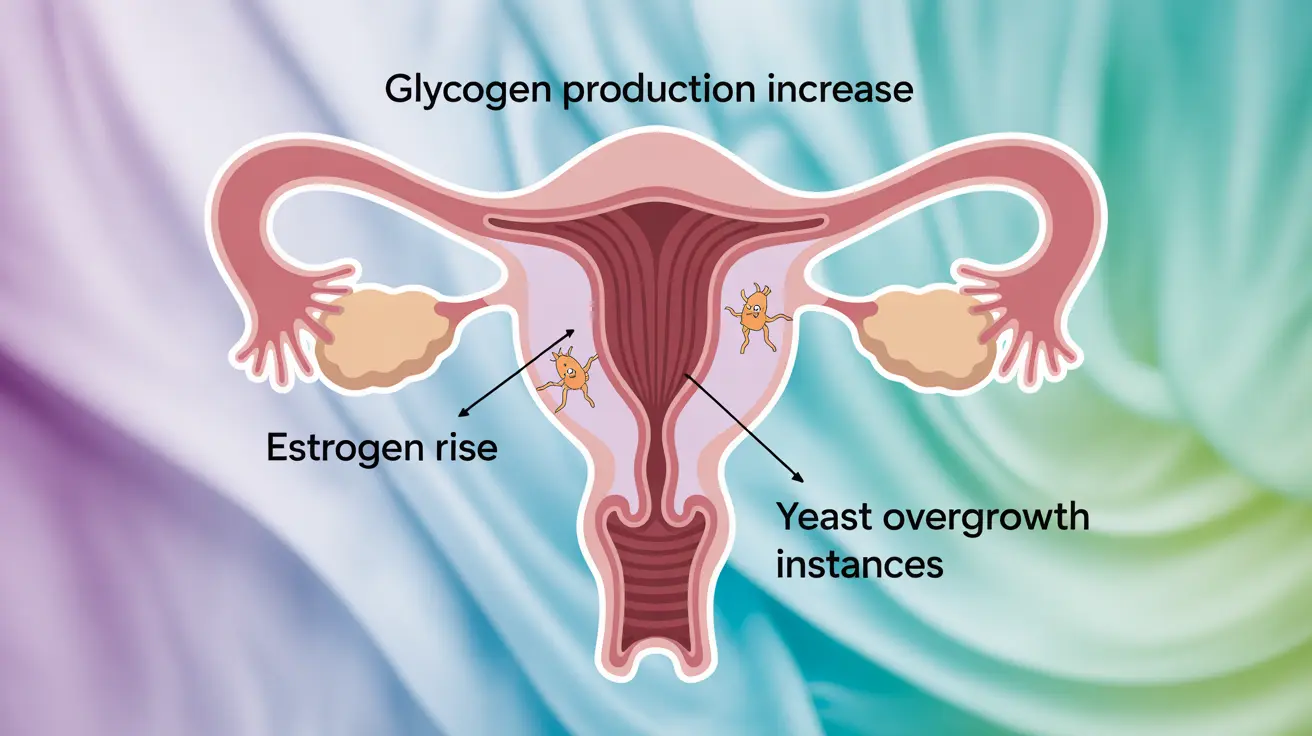Many women experience the frustrating occurrence of yeast infections before their menstrual cycle begins. This common yet uncomfortable condition affects millions of women and can significantly impact their well-being during an already challenging time of the month. Understanding why these infections occur and how to manage them effectively is crucial for maintaining optimal vaginal health.
In this comprehensive guide, we'll explore the connection between menstruation and yeast infections, identify key symptoms, and discuss effective treatment and prevention strategies. We'll also help you understand when it's time to seek professional medical attention.
The Menstrual Cycle-Yeast Connection
Hormonal fluctuations during your menstrual cycle can create an environment that promotes yeast overgrowth. Just before menstruation, estrogen levels rise, which can increase glycogen production in vaginal tissues. Yeast organisms feed on this glycogen, potentially leading to an overgrowth and subsequent infection.
Additionally, changes in vaginal pH levels and immune system function during this time can make you more susceptible to developing a yeast infection. Understanding these biological factors can help you better prepare for and prevent infections.
Identifying Pre-Menstrual Yeast Infection Symptoms
Recognizing the signs of a yeast infection before your period is essential for proper treatment. Common symptoms include:
- Intense itching in and around the vagina
- Thick, white, cottage cheese-like discharge
- Redness and swelling of the vulva
- Burning sensation during urination
- Discomfort during intercourse
- Mild to moderate vaginal soreness
Treatment Options and Solutions
Several effective treatment approaches are available for managing yeast infections that occur before your period:
Over-the-Counter Treatments
Many women find relief using OTC antifungal medications, available in various forms:
- Vaginal creams
- Suppositories
- Oral tablets
Prescription Medications
For recurring or severe infections, your healthcare provider may prescribe:
- Stronger antifungal medications
- Extended-course treatments
- Preventive therapy
Prevention Strategies
Taking proactive steps to prevent yeast infections before your period can significantly reduce their occurrence:
Daily Habits
- Wear breathable, cotton underwear
- Avoid tight-fitting clothes
- Change out of wet swimsuits promptly
- Keep the vaginal area dry
- Practice proper hygiene without over-cleaning
Dietary Considerations
Some dietary modifications may help prevent yeast infections:
- Reduce sugar intake
- Include probiotic-rich foods
- Stay well-hydrated
- Consider probiotic supplements
When to Seek Medical Care
While many yeast infections can be treated at home, certain situations warrant professional medical attention:
- Recurring infections (4 or more per year)
- Severe symptoms that don't improve with OTC treatment
- Uncertainty about whether symptoms indicate a yeast infection
- Pregnancy
- Diabetes or compromised immune system
Frequently Asked Questions
Why do yeast infections often occur before my period starts?
Yeast infections commonly occur before periods due to hormonal fluctuations that affect vaginal pH levels and glycogen production. These changes can create an environment where yeast organisms thrive, leading to infection.
What are the common symptoms of a yeast infection before menstruation?
Common symptoms include intense itching, thick white discharge, redness and swelling of the vulva, burning during urination, and vaginal soreness. These symptoms may be more noticeable or severe in the days leading up to your period.
How can I treat a yeast infection that happens before my period?
Treatment options include over-the-counter antifungal medications in cream, suppository, or oral form. For recurring infections, prescription medications may be necessary. Always complete the full course of treatment, even if symptoms improve.
What lifestyle changes can help prevent yeast infections before menstruation?
Key prevention strategies include wearing breathable cotton underwear, avoiding tight clothing, maintaining proper hygiene, reducing sugar intake, and considering probiotic supplements. Keeping the vaginal area dry and clean is also essential.
When should I see a doctor if I get yeast infections before my period?
Consult a healthcare provider if you experience recurring infections (4 or more yearly), if symptoms are severe or don't improve with OTC treatment, if you're pregnant, or if you have underlying conditions like diabetes. It's also important to confirm that your symptoms are indeed caused by a yeast infection.




